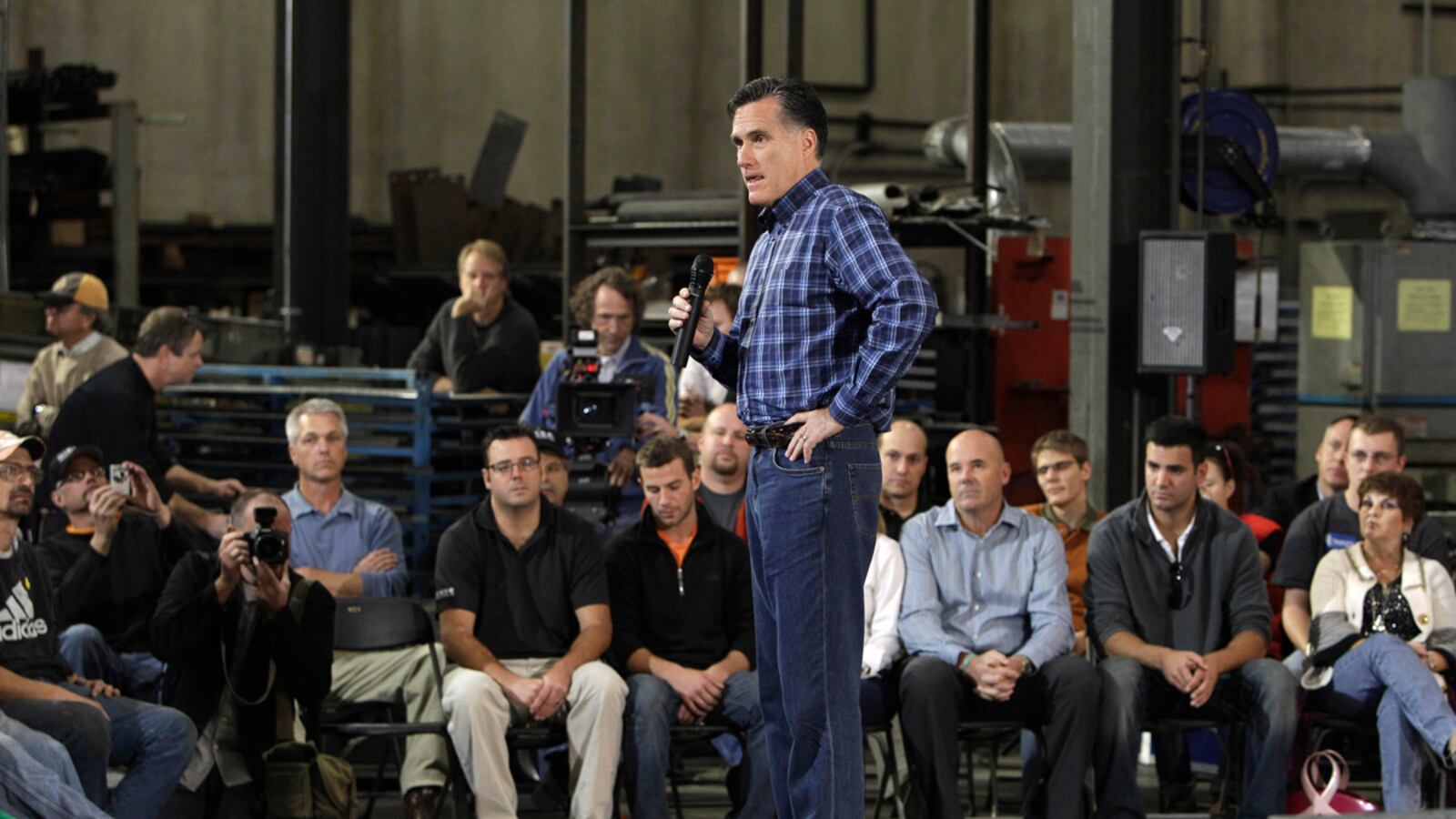Why do so many prominent pundits and politicos on the right who embraced Mitt Romney as their champion in 2008 reject him now as a gutless, unprincipled moderate and unworthy standard-bearer for the conservative cause?
The answer to that uncomfortable question has nothing to do with changes in Romney. If anything, he’s gotten more conservative in the last four years. But it does indicate troubling tendencies within the Republican Party and the nation itself.
In February 2008, the most influential and persuasive right-winger of ’em all threw his all-important support to Romney’s then struggling candidacy. “I think now, based on the way the campaign has shaken out, that there probably is a candidate on our side who does embody all three legs of the conservative stool, and that’s Romney,” Rush Limbaugh told his huge audience. “The three legs of the stool are national security/foreign policy, the social conservatives, and the fiscal conservatives.”
After Rush highlighted the de facto endorsement in his newsletter under the headline “One Candidate Now Represents All Three Legs of Conservatism,” the rest of syndicated talk radio—Sean Hannity, Mark Levin, Michael Savage, Glenn Beck—largely followed suit. Laura Ingraham introduced Romney at CPAC as a “true conservative” and “a conservative’s conservative.” (Alone among the top-rated national hosts, I openly dissented and proudly endorsed McCain.) Even Jim DeMint, the most conservative member of the U.S. Senate, fell in line behind the Mittster.
But this time, conservatives seem wary, cynical, or downright hostile to Romney’s smooth and formidable campaign. Instead of praising Romney as the perfectly balanced, three-legged-stool conservative dream candidate, El Rushbo said just last month: “Romney is not a conservative. He’s not, folks. You can argue with me all day long on that, but he isn’t.” Erick Erickson of RedState.com goes even further, wailing, “Mitt Romney is going to be the Republican nominee. And his general election campaign will be an utter disaster for conservatives as he takes the GOP down with him and burns up what it means to be a conservative in the process … He is neither liberal nor conservative. He is simply unprincipled.”

What did Romney do, exactly, to inspire such angry contempt?
On no major issue did he move to the center in the last four years, and on several, such as Medicare reform and environmental regulation he moved decisively, even boldly, to the right. The conservative commitments he made in 2008 on social issues and other matters of policy remain firmly intact, and the notorious flip-flops with which his thinking “evolved” over the years have receded further into the past, mostly before 2005, and so should seem less relevant, not more so.
Furthermore, as a candidate Romney has vastly improved with his self-assured, focused, and coherent debate performances, and a more genial and engaging, less plastic and patrician, personality. Looking at tape from four years ago and comparing it to the polished, capable candidate on display today, it’s easy to find reasons to rally to Romney’s cause this time but impossible to discern any change for the worse.
Why, then, the stubborn conservative resistance to Romney’s seemingly inevitable nomination?
Some of his critics claim that right-wingers oppose him this time because they can select among better, more viable alternatives than in 2008, when some conservatives would have done anything to stop McCain. This argument, however, displays a short, selective memory: in what way do formidable figures like former governor Mike Huckabee and former senator Fred Thompson, with all their governmental experience and folksy charm, count as less plausible or impressive than the likes of Rick Perry and Herman Cain? Moreover, the impassioned conservative 2012 candidates from the House of Representatives (Newt Gingrich, Michele Bachmann, and Ron Paul) hardly overwhelm the trio of House contenders from 2008 (Duncan Hunter, Tom Tancredo … and Ron Paul).
Part of Romney’s problem in this year’s race stems from Obama’s disastrous decision to push through his ill-considered health-care reform, which brings fresh focus on Romney’s own sweeping and controversial insurance plan in Massachusetts. But Mitt had finished any tinkering with medical mandates by the time he left the governorship at the end of 2006, and in the intervening years he fought Obamacare from the beginning and came up with refreshing proposals for more practical, market-based reforms.
The real problem for Romney this time around involves something deeper and more disturbing than questions of policy, and centers on the utterly changed mood in the country at large and particularly within the Republican Party. Four years ago, despite the beginning stages of the economic meltdown and the last stages of a painful war in Iraq, the nation yearned unmistakably for unifying, reassuring leadership. Barack Obama pledged to fill that need and won the presidency largely based on his hopeful promises to bring people together, bridging barriers of black and white, rich and poor, progressive and conservative.
Today, after four years of incompetence, reckless spending, self-infatuated grandiosity and shameless class warfare, neither side touts compromise or cooperation while both try to rally their die-hard loyalists with promises to follow Conan thre Barbarian’s prescription for “what’s best in life: to crush your enemies, see them driven before you, and to hear the lamentations of their women” (OK, maybe not the last part).
Amazingly enough, in the midst of the debt-ceiling debacle this summer, all the current leaders in the GOP presidential field (yes, including Mitt Romney!) urged John Boehner to risk default and national disaster rather than reach any deal with the dreaded Democrats. As the supercommittee struggles to craft some sort of agreement before the doomsday deadline at the end of this month, fierce partisans on both side refuse to give ground and hammer out an agreement that might reduce the deficit and save the country. Democrats claim that Republicans want to wreck the economy for political advantage, or to steal more money from the poor for their rich Wall Street friends; conservatives insist that Obama and his minions scheme to wreck the economy to impose their vision of a totalitarian socialist utopia.
In other words, a moment of aspiration has given way to an era of anger, while hope and change morphed into rage and paranoia. Some measure of the sad state of the nation, and of the conservative movement, can be gathered from the desperate weeks that the preening demagogue Donald Trump actually received serious consideration as a presidential possibility.
In this atmosphere Romney looks suspect to many activists on the right not because he isn’t conservative enough but because he isn’t angry enough. His real problem isn’t a question of ideology, it’s a matter of attitude. Mitt can’t keep himself from looking self-possessed and unflappable, cool and collected, reasonable and restrained. Rage isn’t part of his emotional repertoire: even when visibly frustrated by Rick Perry’s boorish disregard of all rules of debate in the Las Vegas slugfest, he came across as more pained and perplexed than infuriated.
Like most seriously successful businessmen, Mitt is a pragmatic problem solver, a sensible fixer, a technocrat. It’s easy to imagine him rolling up his carefully cuff-linked sleeves to begin a process of cooperative, institutional repair in Washington, but it’s tough to visualize the perfectly poised governor at the head of an avenging conservative army, laying waste to the opposition in a merciless effort to smash the remaining redoubts of their power.
Four years ago, Mike Huckabee delighted his many admirers with a wonderful line that seemed to capture the more hopeful spirit of that time. “I’m a conservative,” he liked to say, “but I’m not angry about it.”
The fact that Mitt Romney’s lack of anger and indignation has become a disqualifying attribute to many of his conservative critics isn’t just a problem for Romney or for Republicans. It’s an alarming development for the United States of America.






